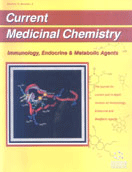Abstract
Mammalian ATP-citrate lyase (EC 4.1.3.8) is the main enzyme responsible for the supply of acetyl-CoA for synthetic pathways. The enzyme is present in most tissues but particularly in those with an active de novo synthesis of fatty acids like adipose tissue and liver, especially during conditions of carbohydrate surplus. ATP-citrate lyase is the only enzyme shared by the synthetic pathways of fatty acid and cholesterol synthesis and due to this unique position, it has been proposed that inhibition of this enzyme may be more efficacious in correcting (mixed) hyperlipidemia than statins. In this manuscript we discuss the regulation of (hepatic) fatty acid and cholesterol synthesis and review the data on the in vitro and in vivo effects of inhibition of ATP-citrate lyase on lipid and lipoprotein metabolism. We also review the literature on the identification of inhibitors of ATP-citrate lyase. It is concluded that ATP-citrate lyase is a target for hypolipidemic intervention but that a final evaluation requires the identification of more potent inhibitors of this enzyme.
Keywords: hypolipidemic intervention, atp-citrate lyase, hyperlipidemia, lipoprotein metabolism, inhibitors of atp-citrate lyase
 8
8






